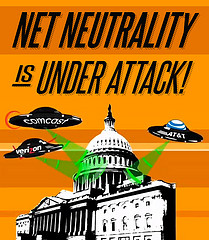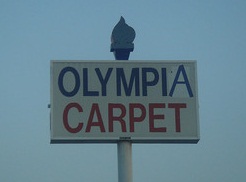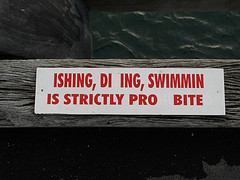Copyright 2007-25 Digital Media Law Project and respective authors. Except where otherwise noted,
content on this site is licensed under a Creative Commons Attribution-Noncommercial-ShareAlike 3.0 License: Details.
Use of this site is pursuant to our Terms of Use and Privacy Notice.
content on this site is licensed under a Creative Commons Attribution-Noncommercial-ShareAlike 3.0 License: Details.
Use of this site is pursuant to our Terms of Use and Privacy Notice.


 It is ridiculously easy to create an online forum.
It is ridiculously easy to create an online forum.

 This July, Verizon Communications and MetroPCS Communications filed a brief in the U.S. Court of Appeals for the D.C. Circuit, arguing that the Federal Communications Commission (FCC) lacks the authority to enact net neutrality rules and that these neutrality rules are unconstitutional under the First and Fifth Amendments. Now, debate over the FCC's approach to net neutrality is not a recent development.
This July, Verizon Communications and MetroPCS Communications filed a brief in the U.S. Court of Appeals for the D.C. Circuit, arguing that the Federal Communications Commission (FCC) lacks the authority to enact net neutrality rules and that these neutrality rules are unconstitutional under the First and Fifth Amendments. Now, debate over the FCC's approach to net neutrality is not a recent development. The U.S. Olympic Committee ("USOC") has a reputation for aggressively policing their exclusive rights to certain words, phrases, and symbols. And they have a special act of Congress to back them up.
The U.S. Olympic Committee ("USOC") has a reputation for aggressively policing their exclusive rights to certain words, phrases, and symbols. And they have a special act of Congress to back them up.
 The issue of same-sex unions is hotly debated, and the discussion is heating up this election year with the case on California’s Proposition 8 making its way to the Supreme Court, and with President Obama recently declaring that he is in favor of same-sex marriage.
The issue of same-sex unions is hotly debated, and the discussion is heating up this election year with the case on California’s Proposition 8 making its way to the Supreme Court, and with President Obama recently declaring that he is in favor of same-sex marriage.
 Some of the most commercially successful and popular music of all time – including the entire catalog of The Beatles – is subject to a degree of uncertainty under current copyright law in the United States due to an anomaly in the federal copyright framework with respect to older sound recordings.
Some of the most commercially successful and popular music of all time – including the entire catalog of The Beatles – is subject to a degree of uncertainty under current copyright law in the United States due to an anomaly in the federal copyright framework with respect to older sound recordings. A pending law review article -- and two of the Supreme Court's recent major decisions -- provide vivid examples that judges (and Supreme Court justices in particular) often use
"extrinsic evidence" (materials other than what the lawyers present to
them in briefs, trial, or argument) to make judicial rulings. In recent decisions, this material is often found online.
A pending law review article -- and two of the Supreme Court's recent major decisions -- provide vivid examples that judges (and Supreme Court justices in particular) often use
"extrinsic evidence" (materials other than what the lawyers present to
them in briefs, trial, or argument) to make judicial rulings. In recent decisions, this material is often found online.
 On a motion for reconsideration, an Illinois trial judge who
On a motion for reconsideration, an Illinois trial judge who  In my four years in Providence, I undoubtedly told some white lies online.
In my four years in Providence, I undoubtedly told some white lies online. The judicial system in the United States has kept up with technological change in many ways. We have
The judicial system in the United States has kept up with technological change in many ways. We have  On the morning of July 11, the House Judiciary Subcommittee on Crime, Terrorism, and National Security held a
On the morning of July 11, the House Judiciary Subcommittee on Crime, Terrorism, and National Security held a  The nation's largest Internet service providers, in an unprecedented partnership with titans of the entertainment industry, have agreed to implement a uniform policy aimed at deterring online copyright infringement known as the
The nation's largest Internet service providers, in an unprecedented partnership with titans of the entertainment industry, have agreed to implement a uniform policy aimed at deterring online copyright infringement known as the  On June 28, 2012, the U.S. Supreme Court held that the
On June 28, 2012, the U.S. Supreme Court held that the  When hearing the expression “lèse majesté,” images of the Queen of Hearts ordering heads to be chopped off ASAP may come to mind. Marie-Antoinette, the queen who was once a “majesté” in France, herself lost her head during the French Revolution. Surely, the crime of lèse majesté is now a thing of the past?
When hearing the expression “lèse majesté,” images of the Queen of Hearts ordering heads to be chopped off ASAP may come to mind. Marie-Antoinette, the queen who was once a “majesté” in France, herself lost her head during the French Revolution. Surely, the crime of lèse majesté is now a thing of the past?
 As a lawyer licensed in five states (MA, FL, CA, AZ, and NV) and who practices free speech law nationwide, I am in a position to comment on the relative merits of various states' views on First Amendment principles. Among the many states where I have worked on cases, Flori-duh is the worst. Hands down.
As a lawyer licensed in five states (MA, FL, CA, AZ, and NV) and who practices free speech law nationwide, I am in a position to comment on the relative merits of various states' views on First Amendment principles. Among the many states where I have worked on cases, Flori-duh is the worst. Hands down.
 Another day. Another "I created Facebook first" case.
Another day. Another "I created Facebook first" case.


